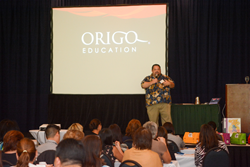Hawaii Leads the Way in Tackling Nation’s Low Ranking Math Scores


Honolulu, HI (PRWEB) August 21, 2014
Hawaiian students will begin the 2014/2015 school year with a new curriculum that brings a more focused, rigorous approach to mathematics instruction. Mathematics aptitude among American students has long been a concern of educators, parents, and government officials alike. Ironically, the last state to join the nation is the first to implement a state-wide innovative math program. Committees of classroom teachers evaluated numerous curricula and voted to adopt ORIGO Stepping Stones.
Over the course of the next three years, Stepping Stones will be implemented in every elementary public school in the state. “Previously, the state’s 255 public schools were using 288 different math curricula,” said Dewey Gottlieb, Department of Education Math Specialist. After the adoption was announced, educators from Hawaii gathered for a one-day conference to learn more about the new program that will support Hawaii in its transition to the Common Core State Standards (CCSS). Both the CCSS and ORIGO Stepping Stones emphasize critical thinking and learning mathematical concepts over rote memorization. They also narrow the scope of the content taught in order to focus on building a solid mathematical foundation.
Hawaii has already made significant gains in mathematics achievement, and the state’s education leaders believe that Stepping Stones will further this progress. According to the Hawaii Public Schools website, the state’s students are currently ranked 7th in the nation for the percentage of students achieving at or above mathematics proficiency. In 2013, the state’s fourth graders scored above the national average in math for the first time, as reported in “The Nation’s Report Card” released by the National Assessment of Educational Progress (NAEP).
Educators are calling ORIGO Stepping Stones “a breath of fresh air” and “the only program that truly teaches conceptual mathematics.” This shift in instruction helps students learn how to think rather than what to think, as well as help them to develop higher-order math skills. Teachers lead class discussions on problem solving and students apply strategies to find the answer rather than simply plug numbers into a formula. This approach helps students translate mathematical concepts into real-world scenarios, better preparing them for college and career success.
The United States’ competitive edge has always been linked to excellence in the areas of math, science, and technology. For the United States to remain a world leader, educators must embrace the conceptual learning methods of the CCSS that have been developed through decades of research. ORIGO Education is a leading supporter of this approach, which will help students to become internationally competitive.
Related Mathematics Press Releases